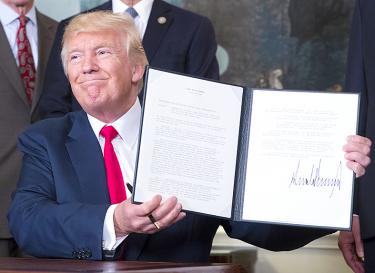US President Donald Trump on Monday signed an executive action that asks his trade office to explore a possible investigation into China for the alleged theft of US technology and intellectual property.
Trump suggested at the afternoon signing that additional steps would be taken against China on trade issues.
Trump said as he signed the memo at the White House: “This is just the beginning.”
The action comes as the US has been seeking help from China to curb North Korea’s development of nuclear weapons.
China criticized Trump’s order for a possible US trade investigation of Beijing’s technology policies as a violation of global rules and yesterday said it would “resolutely safeguard” Chinese interests.
Trade groups for technology companies welcomed Trump’s order, but the Chinese Ministry of Commerce said it violated the spirit of international trade and Washington’s WTO commitments.
The ministry said Beijing would take “all appropriate measures” if Chinese companies are hurt, but gave no details.
Trump told US trade officials to look into whether to launch a formal investigation into whether Beijing improperly requires foreign companies to hand over technology in exchange for market access.
“If the US side disregards the fact it does not respect multilateral trade rules and takes action to damage the economic and trade relations between the two sides, then the Chinese side will never sit back and will take all appropriate measures to resolutely safeguard the legitimate rights and interests of the Chinese side,” the Chinese commerce ministry said in a statement.
Beijing requires automakers and other foreign companies in China to work through joint ventures, usually with state-owned partners. They are often required to give technology to partners that might become competitors.
More than 20 percent of 100 US companies that responded to a survey by the US-China Business Council, an industry group, said they were asked to transfer technology within the past three years as a condition of market access, said Jake Parker, the group’s vice president for China operations.
“We don’t believe market access should be contingent on transferring technology,” Parker said. “It goes counter to China’s WTO commitments.”
Foreign business groups complain companies are being squeezed out of promising Chinese markets or pressured to hand over technology for electric cars and other emerging industries.
Trump said in April he was setting aside trade disputes while Washington and Beijing worked together to persuade North Korea to give up nuclear weapons development, but US officials have resumed criticizing Chinese policy in recent weeks.
“The White House is right to make clear all options are on the table,” Robert Atkinson, president of the Information Technology and Innovation Foundation, an industry group in Washington, said in a statement.
The Chinese commerce ministry complained Trump’s order was “strong unilateralism” that violated the spirit of multinational trade agreements.
“We believe the US side should strictly adhere to commitments and should not become the destroyer of multilateral rules,” the statement said.




